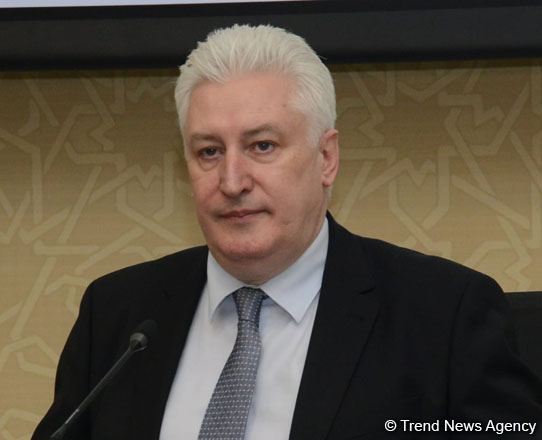BAKU, Azerbaijan, Sept.27
By Jani Babayeva - Trend:
The Second Karabakh War [ lasted for 44 days - from late Sept. to early Nov.2020] is an example of a high-tech war of the 21st century, editor-in-chief of Russian influential “Natsionalnaya oborona” (National Defence) magazine, well-known military expert Igor Korotchenko told Trend.
“As to date, none of the leading world powers has been able to demonstrate what Azerbaijan has done. That’s why the Second Karabakh War is carefully analyzed and continues to be studied in the US, UK, Russia, France, and Israel - wherever the factor of military power is important,” Korotchenko said. “This is an example of war with the use of new strategies and modern technologies. First of all, this was unprecedented, in military history, simultaneous use of a wide range of reconnaissance and attack drones, which made it possible to change the idea of what a high-tech war of the XXI century should be like.”
“We also shouldn't forget the exceptionally effective actions of the Azerbaijani special forces. Azerbaijan has shown that it has found new non-standard, effective and high-tech methods of warfare, which ultimately led to victory,” he noted.
The expert stressed that the number one factor in any war - the Supreme Commander-in-Chief, because namely he implements the plans of the war, proposes key operations, controls their preparation and ultimately implements them, bearing political and military responsibility for this.
“In this regard, in 44 days of the Second Karabakh War, Azerbaijan achieved to do what the international community failed to achieve in almost 30 years – the country restored its territorial integrity by implementing four UN Security Council resolutions that called for it,” Korotchenko said. “We saw that the attempts of the OSCE Minsk Group to solve this problem faced insurmountable obstacles, and in the end this Gordian knot was cut with a sharp sword forged by Azerbaijan.”
According to him, the victory in the Second Karabakh War is a triumph of diplomacy, economy and an effective political system of power, since all these components are extremely important and most essential in the conduct of a war.
“War is always a test of the quality of any country, any army, and any leader. Azerbaijan emerged as an unconditional triumphant. Today, exercises and plans for military development in some states are being adjusted based on the Azerbaijani experience,” he added.
Korotchenko stressed that presently Azerbaijan is a key geopolitical player not only in the South Caucasus, but also on the international arena.
“This was achieved primarily by the potential of Azerbaijan, then by the victory in the Second Karabakh War, and also by Azerbaijan's contribution to the implementation of large-scale energy projects. All these components have significantly increased and strengthened the authority and role of Azerbaijan in the modern system of international relations,” the expert noted.
“Of course, the figure of the leader is very important - the fact that such a powerful, effective and responsible leader as Azerbaijani President Ilham Aliyev deserves unconditional respect,” he said. “The president is a politician who was able to solve in 44 days something that wasn’t solved for decades, showing real will, potential, political and military capabilities for the triumph of international law and the principles of territorial integrity.”
Korotchenko also added that it’s very important to politically consolidate the results of the Second Karabakh War, including the implementation of the 3+3 program [with possible involvement of Azerbaijan, Armenia, Russia, Georgia, Turkey and Iran], which will ensure the peaceful, progressive and dynamic development of the region.
“Currently, one of the most key roles in the Caspian region is undoubtedly played by Azerbaijan, which will only strengthen its position and increase its potential in terms of contributing to international stability and ensuring the sustainable development goals that face the entire international community,” he said.
Following over a month of military action to liberate its territories from Armenian occupation from late Sept. to early Nov. 2020, Azerbaijan has pushed Armenia to sign the surrender document. A joint statement on the matter was made by the Azerbaijani president, Armenia's PM, and the president of Russia. A complete ceasefire and a cessation of all hostilities in the zone of the Karabakh conflict were introduced on Nov. 10, 2020.
The conflict between the two South Caucasus countries began in 1988 when Armenia made territorial claims against Azerbaijan. As a result of the ensuing war, the Armenian Armed Forces occupied 20 percent of Azerbaijan, including the Karabakh region and seven surrounding districts. The 1994 ceasefire agreement was followed by peace negotiations.






